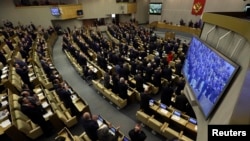The Russian parliament on Friday elected a retired senior police officer to serve as presidential human rights ombudsman amid an outcry about her lack of democratic credentials.
The State Duma voted overwhelmingly for Tatyana Moskalkova, a police general and lawmaker of the Just Russia party, on Friday. President Vladimir Putin had the right to nominate a candidate, but he did not do so.
The 60-year-old Moskalkova, who worked in the Interior Ministry for more than two decades, was an odds-on favorite after the ruling United Russia party threw its weight behind her. Her nomination, however, enraged Russia's human rights advocates who saw a clear conflict of interest in such an appointment.
Activists of the Yabloko party picketed the Duma Friday morning to protest Moskalkova's candidacy.
Moskalkova's predecessors had strong democratic credentials and often used their position to raise flagrant right violations and put the pressure on law enforcement and prison officials. A lot of Russian human rights activists have a background in the Soviet dissident movement and have been exiled or sent to prison for their work.
The police general's nomination baffled even far-right politician Vladimir Zhirinovsky.
Moskalkova ``is a great person but her work in the Soviet police and in the police under (President Boris) Yeltsin cannot give us any reason to think that she is able and wants to defend human rights,'' Zhirinovsky told the parliament during debates.
As in the Soviet times, police in Russia are still considered as a source of widespread abuse of human rights.
Moskalkova's speech at the parliament on Friday only confirmed expectations of her hawkish position. She told the parliament she would focus on how rights are violated in health care and housing, and lashed out at what she described as attempts to take advantage of Russia's poor human rights record.
"Western and American bodies have come to use the issue of human rights as a tool of blackmail, abuse, threats and attempts to put the pressure on Russia,'' she said. "The human rights ombudsman has plenty of tools to counter that.''
She did not specify what human rights issues she was talking about.
Moskalkova also said she would fight for the rights of Russians living abroad and said it is important for her to "defend Russian values, not just the rights of one person.''
Russia Elects Retired Police Chief as Human Rights Ombudsman

MOSCOW —









